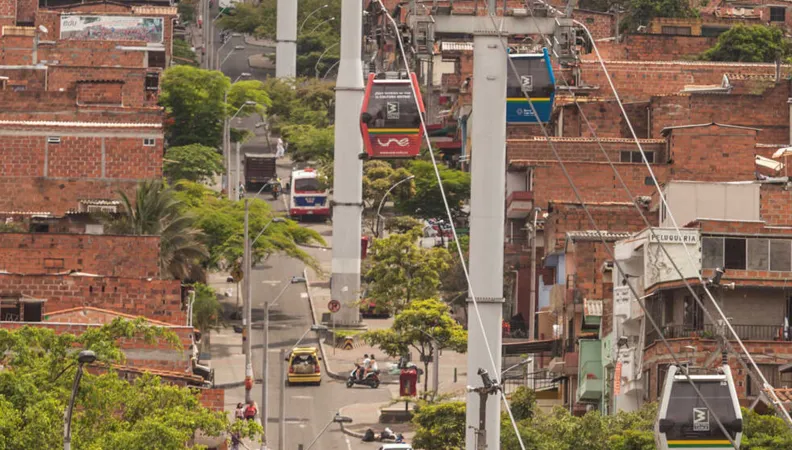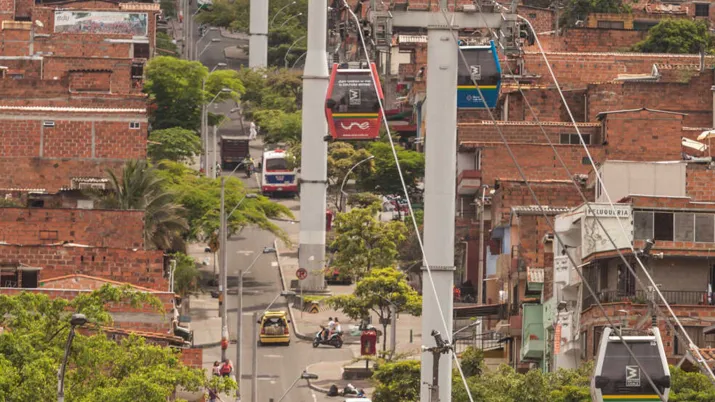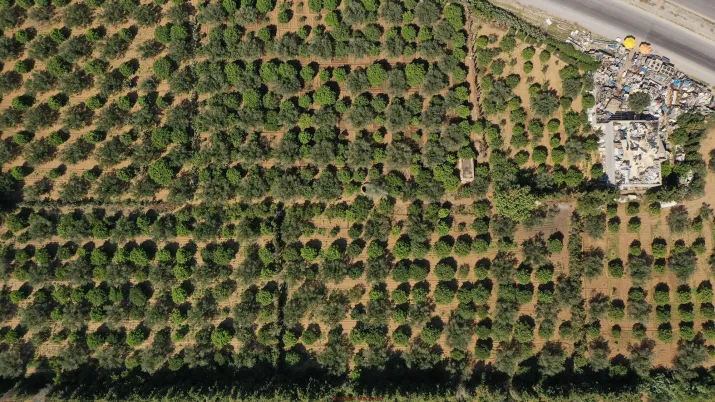Le septième ODD est au centre de des défis majeurs d’aujourd’hui mais aussi des opportunités de demain. Qu’il s’agisse de lutter contre le changement climatique bien sûr, mais aussi de développer les emplois, les logements, les connexions, la sécurité, la production de nourriture, etc., l’accès de tous à une énergie durable est essentiel. Cet ODD constitue indubitablement une opportunité pour transformer les vies, les économies et la planète.
 © AFD
© AFD
 Can South Africa secure the necessary investments to transition to a low-carbon economy and adapt its infrastructure to climate change, while balancing economic growth and maintaining macro-financial stability? AFD is supporting South Africa in addressing climate change through the GEMMES South Africa project, developed with academic and institutional partners.
Can South Africa secure the necessary investments to transition to a low-carbon economy and adapt its infrastructure to climate change, while balancing economic growth and maintaining macro-financial stability? AFD is supporting South Africa in addressing climate change through the GEMMES South Africa project, developed with academic and institutional partners.
Context
South Africa requires significant investment to transition to a low-carbon economy and resilient infrastructure, especially in energy and water sectors. Heavily reliant on coal and facing increasing water scarcity due to climate change, South Africa’s shift towards sustainability is crucial for long-term environmental and economic stability.
With the support of AFD, the University of Cape Town (UCT), Development Bank of Southern Africa (DBSA), Presidential Climate Commission (PCC), National Treasury, and the Centre for Sustainability Transitions of Stellenbosch University are developing a model that evaluates the macroeconomic impacts and various policy options and financing mechanisms for transitioning South Africa's water, energy, and food (WEF) systems in response to climate challenges.
This project falls under the “South Africa – Towards Inclusive Economic Development” (SA-TIED) initiative, a research and policy programme aimed at fostering inclusive economic growth in South Africa.
The GEMMES programme is developing a general theoretical model on the one hand, and national models applied to concrete cases and adapted to the characteristics of each country on the other, including the GEMMES South Africa model.
Objectives
The GEMMES South Africa project aims to:
- Analyze the macro-financial impacts of transitioning to renewable energy, ensuring water security, and maintaining food sustainability;
- Provide policymakers with insights and forecasts to inform decision-making and long-term planning for economic growth, employment, and climate resilience and more specifically provide insights into the macroeconomic effects of climate-resilient investments up to 2050;
- Enhance understanding of the vulnerabilities and opportunities in South Africa’s transition by integrating macro-financial feedback loops into structural change analysis;
- Foster sustainable development and mitigate environmental risks, contributing to long-term economic stability and improved quality of life;
- Promoting public policy dialogue on South Africa's low carbon transition.
Method
In addition to its specific transdisciplinary approach, which makes this project one of the few to integrate the notion of strong sustainability, the originality of GEMMES lies in its consideration of macro-financial imbalances and the impact of the low-carbon transition on all elements of the balance of payments.
GEMMES South Africa builds on UCT’s SATIM-GE energy transition model incorporating macro-financial feedback loops, which provide critical insights into the country's economic vulnerabilities and investment opportunities during this transition.
GEMMES South Africa is built in partnership with local authorities and research institutes to guarantee that the tool is coherent with the country's needs and to assure that the partners are capable of using and improving independently. It will account for:
- the dynamics of interest and exchange rates and their impact on private investment and employment;
- the fiscal and macro-financial constraints;
- different dynamics between banks and non-bank financial institutions;
- the capacity of public investments in green infrastructure to drive a new ecological transformation plan;
- and, the impacts of climate changes.
Expected results
The GEMMES South Africa project anticipates several key publications, including:
- A presentation of the specificities of GEMMES-South Africa and its baseline simulations;
- The macro-financial implications of infrastructures investments;
- The macro-financial implications of climate change impacts.
These papers will provide valuable insights into the project's findings and contribute to ongoing discussions in the field.
Research findings
At this stage, while the project is still in its early phases, it is expected that integrating macro-financial feedback loops will play a significant role in shaping effective policies and investment strategies. As the project progresses, ongoing stakeholder dialogue will be crucial in refining these concepts and addressing future challenges in the transition process.
Download the publications related to other South Africa modelling projects:
Want to stay updated on AFD’s latest research?
Discover other GEMMES projects
 Colombia has demonstrated its commitment to climate issues through its commitment to implementing its nationally determined contribution (NDC) under the Paris Agreement. Developing an ecologically and economically sustainable development trajectory is a significant challenge, which the GEMMES Colombia project supports through sound methodology and policy-based dialogue.
Colombia has demonstrated its commitment to climate issues through its commitment to implementing its nationally determined contribution (NDC) under the Paris Agreement. Developing an ecologically and economically sustainable development trajectory is a significant challenge, which the GEMMES Colombia project supports through sound methodology and policy-based dialogue.
Context
Highly exposed to the effects of climate change and to the degradation of natural resources, Colombia is strengthening its climate policy, considering a green growth strategy, particularly since the 2014-2018 National Development Plan. Nevertheless, the country's dependence on raw material exports and its strong integration into international financial markets generate monetary, financial and commercial vulnerabilities.
AFD is supporting Colombia in its efforts to tackle climate change through the GEMMES Colombia project, which is part of the third climate policy loan since 2018. The GEMMES programme, by integrating the impact of climate change into its forecasts, is developing a general theoretical model on the one hand, and national models applied to concrete cases and adapted to the characteristics of each country on the other, including the GEMMES Colombia model.
About GEMMES: AFD and Macroeconomic Modelling Tools for the Ecological Transition
Goal
The GEMMES Colombia project, which is fully in line with AFD's commitment to strong sustainability, aims to :
- Highlight potential fragilities in the Colombian economy through a better understanding of the interactions between fiscal, monetary and trade policies and the country's NDC objectives;
- Identify the opportunities generated by the energy transition in Colombia: structural changes and financing methods under the best possible conditions;
- Quantifying the macroeconomic impact of NDC-related investments, particularly in the financial and tax sectors;
- Promoting public policy dialogue on Colombia's energy transition:
- Providing a decision-making tool for decision-makers on climate policies, with a view to limiting the consequences identified without compromising the implementation of Colombia's NDC objectives;
- By promoting the appropriation and sustainability of the GEMMES modelling tool within the partner institutions.
Read also: Diego Guevara: "We cannot develop sustainably if we lack the resources"
Method
In addition to its specific transdisciplinary approach, which makes this project one of the few to integrate the notion of strong sustainability, the originality of GEMMES lies in its consideration of macro-financial imbalances and the impact of the low-carbon transition on all elements of the balance of payments.
Moreover, GEMMES Colombia is part of a partnership initiative that is organised around two phases:
- The first phase is based on the development of the model and the macroeconomic analysis of the Colombian NDC trajectory, in partnership with the National Planning Department (DNP) and the Ministry of Finance (MHCP) supported by AFD's modelling teams.
- The second is intended to ensure the sustainability of the project after the end of the support, with the analysis by the National University of Bogota (UNAL) of the interactions between trade, fiscal and monetary policies and the NDC trajectory, as well as the training of students in sustainable development through the Catedra course as well as in the GEMMES methodological approach.
Results
The first results of the project have been presented at the virtual congress "Conexión DNP: transfiriendo conocimiento para innovar" on 2 and 3 December 2021. The project partners expressed their satisfaction, with the MHCP showing a particular interest in modelling after a year of remote work due to the Covid-19 pandemic.A university course on sustainable development (Catedra), partly based on the results of the GEMMES Colombia project, was launched on 7 March 2022 at UNAL to raise awareness of the issue.
In March 2022, a university course on sustainable development (Catedra), partly based on the results of the GEMMES Colombia project, was launched at UNAL. As a continuation of this initiative, a second course on the modelling of ecological transitions in the Global South was given in 2023.
The GEMMES Colombia model, enriched by academic expertise and integrated into decision-making processes through Colombian ministries, has become a key tool for public policy dialogue. These exchanges continue thanks to the GEMMES Strategic Committee, composed of the Ministry of Finance and Public Credit (MHCP), the National Planning Department (DNP), the Ministry of Mines and Energy (MME) and the Banco de la República.
At the request of the Colombian authorities, GEMMES was added to the MHCP macroeconomic models in 2023 and was coupled to the Energyscope energy model, an energy assessment and planning tool. Ownership of the model continued in 2024 with executive training on the use of the model provided to MHCP officials.
The research resulted in a collective book published in June 2024, presenting the scientific findings and policy recommendations from the GEMMES Colombia project: Modelling low-carbon transitions in Colombia: Macrofinancial opportunities and risks project. This work also led to the launch of a new project: the creation of a serious game to support multi-stakeholder dialogue around the NDC in Colombia.
Watch the replay of the GEMMES Colombia book launch (in Spanish)
Lessons learned
The GEMMES Colombia model, by developing scenarios on fossil fuel exports and alternative policies for the 2023-2050 period, as well as financing scenarios of the NDC trajectory, contributes to informing decision-makers in their political strategy to fight global warming. The model also allowed the National Planning Department (DNP) to analyze the consequences of economic shocks such as the loss of the country’s investment quality, the reduction of coal exports or the bankruptcy of Evergrande in China.
The conclusion is clear: a diversification of the production structure and a transformation of public finances are essential if Colombia is to meet the challenges of a global low-carbon transition and ensure its own energy transition. The GEMMES model highlights the importance of using a combination of private investment and public green bonds to finance Colombia's climate ambition.
Download the publications related to GEMMES Colombia:
- Can Colombia cope with a global low-carbon transition? (June 2023)
- Low-carbon transition and global macroeconomic vulnerabilites: A multidimensional approach in tracing vulnerabilities and its application in the case of Colombia (July 2023)
- Modelling low-carbon transitions in Colombia: Macrofinancial opportunities and risks (July 2024)
Contact:
- Antoine Godin, economist at AFD, head of the Macroeconomic Modelling Unit
Contacto:
- Antoine Godin, economista, responsable de la célula de modelización macroeconómica GEMMES, AFD



